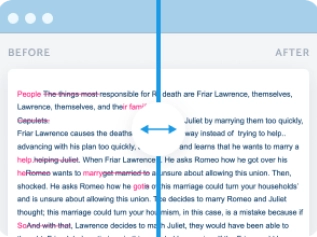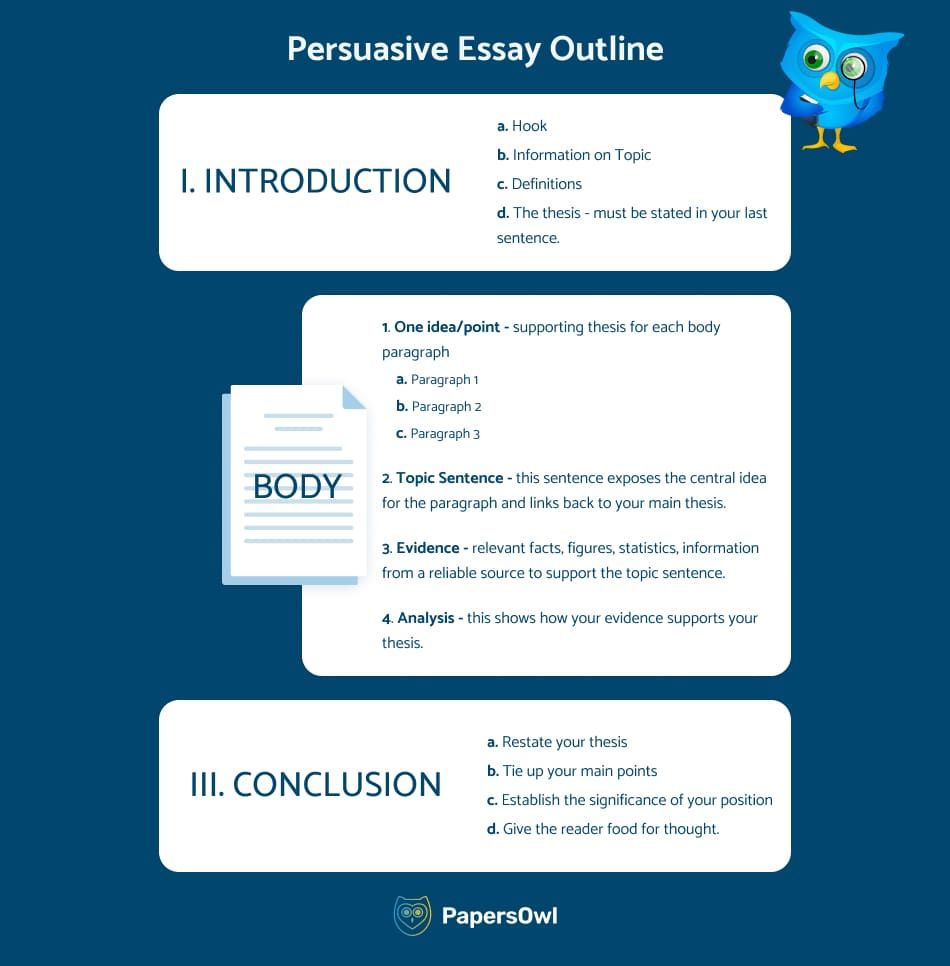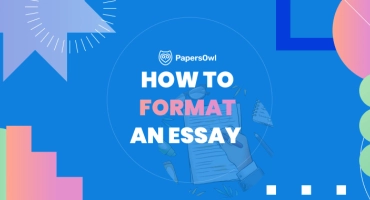Persuasive Essay Outline: A Student’s Guide to Powerful Writing
Table of contents
- 1 Key Features and Objectives of Persuasive Essays
- 2 Persuasive vs. Argumentative Essays
- 3 What Is a Persuasive Essay and Why Structure Matters?
- 4 How Does the Structure of a Persuasive Essay Look?
- 5 The Secrets of an Effective Body Paragraph
- 6 How to Finish a Persuasive Essay?
- 7 Step‑by‑Step Guide to Crafting a Persuasive Essay Outline
- 8 Short Checklist Before You Start Writing
- 9 Persuasive Essay Outline Examples
- 10 Top 10 Tips for Writing a Persuasive Essay
- 11 Writing Essentials: Hook, Thesis, Counterargument, Conclusion
- 12 Transition Words as Part of a Persuasive Sentence
- 13 Persuasive Essay Graphic Organizer and Visual Tools
- 14 Final Thoughts
Writing a persuasive essay isn’t just about sharing your opinion. It’s about shaping facts, emotions, and structure into a clear form that nudges people toward your side. Think of it as building a path — every step must lead the reader where you want them to go.
The writing process starts long before the first word hits the page. It begins with a spark: a topic that needs a voice. From there, a persuasive essay outline becomes your map. Without it, ideas drift and lose weight. A solid persuasive essay outline format gives order to your thoughts and lets your introduction work like a magnet — pulling in attention and setting your tone.
In the end, a well-shaped essay doesn’t shout. It whispers smart things and waits for readers to nod. If you aim to convince readers, that’s where your strength lies.

Key Features and Objectives of Persuasive Essays
A persuasive essay has one job — to make your reader see the world your way. To do that, the persuasive essay structure must be clean and focused. It needs a clear main idea and a strong thesis that guides every word.
Each topic sentence should serve a purpose. It pushes the reader closer to your point. Think of it like tension in a well-strung bow. No sentence is idle. The essay outline acts as the frame, helping you shape the flow.
A solid persuasive essay outline format avoids chaos. It tells the reader where they’re going before they know it. A good outline sets up your voice, facts, and tone. And when questions arise, the structure leads to answers — not more related questions.
In short, the goal of writing a persuasive piece is not noise. It’s clarity. Aim to build something steady and sharp — like a path paved with purpose.
📌 Quick Reminder: A persuasive essay without an outline is like a speech without notes — you might have good points, but you’ll likely miss the mark. Outline first. Always.
Persuasive vs. Argumentative Essays
Objectives
A persuasive essay aims to shift the reader’s thinking. The writer takes a clear position and sticks to it. No room for fence-sitting. It’s less debate, more influence. You build each body paragraph to support your stance — not just present both sides.
An argumentative essay welcomes conflict. It plays host to opposing points. The goal is to prove your side is stronger. A persuasive essay, on the other hand, seeks to guide the reader gently — sometimes with pressure, sometimes with pull. Either way, the argument moves in one direction.
Both forms require solid writing, but their goals are not twins. One wants to convince readers, and the other wants to win. There is a subtle difference, but it has a big impact.
Tone
Tone matters. A persuasive essay often leans into personal opinion. It may stir the pot using emotional appeals. A strong argument, though, balances heat with logic.
Think of it like tuning a signal. Too much emotion? The message distorts. Too dry? The reader turns the page. Persuasive tone whispers, “Trust me.” Argumentative tone declares, “Here’s why.”
Use of Evidence
Every solid argument needs facts. That means you provide evidence from reliable sources. Think beyond textbook quotes. Expert opinions, case studies, and numbers that speak without shouting — those count.
Each body paragraph must hold proof, not just noise. Use data with purpose. Treat it as a signal, not filler.
Approach to the Audience
Know your reader. A persuasive essay talks to the heart. An argumentative essay talks to the head. But both need to grab the reader’s attention from the start.
Your body paragraph is a tool for getting your reader’s attention or challenging their views. Use it well. Build your argument not like a wall but like a bridge.
What Is a Persuasive Essay and Why Structure Matters?
| Section | Content |
| Definition | A persuasive essay uses logic to influence. It answers the question, “What is a persuasive essay?” with clear ideas, real facts, and a simple structure. |
| Importance of Structure | Ideas scatter without form. In academic writing, structure helps your thoughts land. A tight outline keeps the message focused. |
| Start with a Claim | Begin with a bold idea. Let the argument be clear. Use each body paragraph to expand, not to repeat. |
| Use of Evidence | Don’t guess. Provide evidence from studies, logic, or life. Truth wins more minds than noise. |
| Practical Example | One student showed how birds adjust to light pollution. Simple fact, powerful point. That’s persuasive writing that works. |
| Structure in Action | Think of an outline as scaffolding. It holds your thoughts while you build. Each block — your ideas, examples, voice — has a place. |
| Closing Note | Practical examples shape belief. When your essay is in order, even complex ideas become clear. Persuasion needs that path. |
How Does the Structure of a Persuasive Essay Look?
A clear, persuasive essay outline builds your case brick by brick. Like any solid structure, it begins with a base, rises through a central frame, and ends with a top that holds it together. A strong outline includes an introduction, body paragraphs, and a conclusion. Each part has a role. Each argument must hold its shape.
Write a Captivating Introduction
The persuasive essay introduction needs to grab the reader by the collar. The first sentence should be bold — an unexpected fact, a sharp question, or a striking quote. That’s your introduction hook. Follow it with background information — but keep it short. Don’t drown the reader. Just enough to set up the argument. A strong introduction plants a flag. Make it stick.
Give Background Details
Think of this part like drawing the first circle on a telescope lens. It helps the reader see the particular issue. Add a short, attention-grabbing detail. Use something real. A number from a recent study. A story from a lab. This isn’t just writing — this is making the case breathe. Before you push your thesis statement, frame the world it lives in.
State Your Thesis Statement
Now, say what you believe. Directly. Clearly. No fluff. A good thesis statement is not a hint; it’s a flag on the hill. It tells the reader: here’s what I’m defending. And everything that follows — every body paragraph, every argument — must support it. In a persuasive essay outline, the thesis is your north star. Keep every sentence pointed toward it.
The Secrets of an Effective Body Paragraph
In any persuasive paper outline, the real work is the body paragraph. Each paragraph should begin with a sharp topic sentence — a clear point that ties back to your thesis statement. Don’t pile on general thoughts. Get specific.
Each argument needs evidence — statistics, short quotes, or real-world observations. If discussing screen time and attention loss, show a study, not just a belief. A body paragraph should focus on one idea, no more. If you switch gears, start a new one.
Use emotions with care. A powerful story can stick in the reader’s head. A farmer is losing bees. A student frozen by school violence. These don’t replace facts. They add pulse.
Counterargument in a Persuasive Essay
Strong counterarguments don’t weaken your case — they show depth. Mention the opposing viewpoint. Be fair. Then answer it. A solid persuasive essay outline leaves no loose threads. Your reply should not just dismiss. It should explain. Compare it to cooling a heated metal: necessary for balance.
Making Point
Start each section with a clear main point. Don’t bury it. Keep your writing steady and lean. If your essay is about phone bans in school, lead with that. Avoid wandering. Let the reader follow your main argument without stopping to guess.
Presenting Facts
Back every claim with logical reasons and solid evidence. A fact without purpose falls flat. Choose proof that fits the shape of your argument. Don’t just quote — explain. Use data, but tie it back to your persuasive essay outline. Support the thesis statement like it’s under pressure.
Connecting With Emotions
A compelling essay stirs the heart, but never at the cost of truth. Use emotional appeals to echo human experience. A girl is locked out of coding class. A boy is missing school due to floods. These details can tip the scale when logic alone can’t. Make your writing breathe. Then, bring it home with a clear statement.
How to Finish a Persuasive Essay?
A persuasive essay conclusion is not where you relax. It’s where you tighten the last bolt. Your conclusion should not repeat the argument word for word. Instead, it must summarize the journey. Remind the reader why the topic matters. Leave a lasting impression — a sharp image, a truth, or even an interesting fact they can’t unsee.
Picture a researcher staring at stars, looking for order. That’s your role here. Wrap the chaos. Show the pattern.
How to Draw a Logical and Convincing Conclusion?
Start your conclusion by briefly restating the main points. Don’t list — connect. Return to your thesis statement, and show how your writing proved it. This is not filler. It’s the last sentence of a debate. Strong, not loud. Reflect on the introductory paragraph. Was your promise kept? If yes, say it without boast. If not, adjust with honesty.
Example of Outline for a Persuasive Essay

Here’s a persuasive essay outline example on banning plastic bags:
- Introduction: Open with the image of a bird tangled in plastic. Give context. End with your thesis: Plastic bags harm wildlife and should be banned.
- Body Paragraph 1: Explain how plastic pollutes oceans. Add data or a short study.
- Body Paragraph 2: Discuss sustainable alternatives and their success.
- Counterargument: Acknowledge cost concerns. Offer a rebuttal using economic reports.
- Conclusion: Remind readers of the bird. Reinforce the argument. Urge action.
This outline keeps your writing tight, your key points visible, and your purpose clear.
Step‑by‑Step Guide to Crafting a Persuasive Essay Outline
Writing a persuasive essay begins with a plan. A clear, persuasive essay outline helps you stay focused. Each section — from the introduction to the conclusion — should support your main argument.
Step 1: Determine the Topic and Purpose
Pick a topic worth discussing. Ask what you want to prove. Your persuasive essay needs a strong direction. Use a clear thesis statement in your introductory paragraph. It sets up the whole argument and frames the writing.
Step 2: Formulate the Hook and Background
Start your introduction with something bold — a question, a wild fact, or an odd truth. Your introduction hook should draw the reader in. Then, add a brief background on the topic. Make it smooth, but don’t overload. Keep only the key points.
Step 3: Write the Thesis
Now write the heart of your essay. Your thesis must be direct. In writing a persuasive essay, clarity wins. Avoid fluff. A strong thesis statement gives your argument weight and keeps your ideas grounded.
Step 4: Choose 2–3 Arguments + Evidence
List two or three main points that support your view. Add convincing evidence — facts, logic, or real-life outcomes. These points form the main body of your persuasive essay outline. Make sure they link to your thesis.
Step 5: Include the Counterargument + Rebuttal, Make a Conclusion
Address counterarguments. Show the opposing viewpoint, then explain why your stance holds. A strong conclusion should summarize your main points. End with a last sentence that leaves a mark.
Short Checklist Before You Start Writing
- Is your paper outline clear?
- Does your thesis reflect your core arguments as supporting?
- Are your main points strong and focused?
- Did you prepare for counterarguments?
- Ready to write your first draft?
This process makes it easier to start writing confidently and build a powerful, persuasive essay outline.
Persuasive Essay Outline Examples
Using a persuasive essay outline template gives your paper form and direction. Below are three persuasive writing examples tailored to different goals and writing styles. Each includes the first paragraph, thesis, and main points to guide your argument. Use them to draft a paper that convinces, not just informs.
5‑Paragraph Outline (e.g., School Uniforms)
This classic structure suits most school topics.
- Introduction: Present the issue. Hook the reader with a striking fact.
- Thesis: Say clearly why school uniforms are (or aren’t) helpful for students and school administrators.
- Body Paragraph 1: First main point — uniforms reduce peer pressure.
- Body Paragraph 2: Second point — uniforms simplify morning routines.
- Conclusion: Restate your thesis and all the points you made.
This setup works well when writing a persuasive essay for class or a timed writing process.
4‑Paragraph Outline With Counterargument (e.g., Social Media Ban)
Ideal for tighter word counts or stronger debates.
- Introduction: State the topic — banning social media in schools.
- Thesis: Take a clear position early.
- Body Paragraph: Defend your view with strong evidence.
- Counterargument + Conclusion: Acknowledge opposing views and defend your stance.
Use this when your essay must be sharp, short, and thoughtful.
Counterargument Focused Outline (e.g., Online Learning vs. Traditional)
This persuasive research paper outline dives deep into both sides.
- Introduction: Explain the debate over learning methods.
- Main Idea: Defend online learning with real-world data.
- Counterargument: Address concerns like lack of social interaction and screen fatigue.
- Rebuttal + Conclusion: Flip the concerns into strengths. Reinforce your argument and thesis.
This model is best when the point of your writing is to compare two complex ideas in detail.
These essay outlines don’t just help you start writing; they guide the entire essay from spark to finish. When in doubt, map it out.
Top 10 Tips for Writing a Persuasive Essay
Wondering how to write a persuasive essay that sticks? These ten tips help with the writer’s job and turn a shaky idea into an effective paper. Each step below keeps your writing tight, your argument sharp, and your voice clear.
- Create a Strong Title for the Essay. Titles shape first impressions. A sharp title hooks the reader’s attention and hints at your thesis. Ensure it links clearly to your point and sets the argument ahead.
- Share Your Audience’s Interests. A good writer knows their crowd. Fold in what matters to them. Tie your personal opinion to something they care about. That’s how your essay finds grip.
- Use Language and Rhetorical Devices. Sharp phrases and metaphors breathe life into persuasive arguments. A surprising comparison or short parallel can turn a plain essay into a punchy one.
- Integrate References and Citations. Use reliable sources to ground your view. A fact slipped in at the right moment can reinforce the point and sharpen your persuasive essay outline.
- Avoid Fallacies. False logic ruins good essay writing. Stick to logical reasons that hold under pressure. A scattered argument or leap in logic quickly loses trust.
- Employ Storytelling. Nothing pulls readers in like a real tale. A short story or interesting fact in the introduction can be more attention-grabbing than a list of stats. Just make sure it supports the argument.
- Try Essay Persuasive Techniques. Use contrast, repetition, or irony to create an effective argument. Every tool you use should strengthen your point and follow the persuasive essay outline.
- Don’t Depend Too Much on Emotion. It’s tempting to appeal only to feeling. But without solid evidence, your essay loses weight. Emotion needs logic to stand tall.
- Stay Focused. Drifting weakens the case. Keep your main idea in sight. Every section of the essay should echo your main points, from the introduction to the end.
- Edit and Make a Persuasive Essay Format. Revise for tone, spelling, and structure. Correct grammatical errors. Follow a clean essay format. Respect the word count. A polished paper shows the writer’s care. And every persuasive essay outline deserves a solid finish.
These tips don’t just tell you what to do — they show you how to write a persuasive essay with presence. Let each point work hard, and your writing will do the same.

Writing Essentials: Hook, Thesis, Counterargument, Conclusion
Strong structure sets the tone for writing a persuasive essay. Each part of the paper must carry weight from the first word to the last. Below are the essentials.
How to Write a Hook for a Persuasive Essay?
Start sharp. A good hook is not a filler — it’s an ignition. It must be attention-grabbing, setting the reader on edge. A curious claim or quiet question can stir thought. Keep it linked to your point and let it frame the following persuasive essay outline.
How to Create a Strong Persuasive Essay Thesis?
A thesis is not a guess — it’s your backbone. A clean thesis statement tells the reader what you stand for. Don’t pad it. Let the point show through, and ensure it shapes the full persuasive essay outline.
Connecting Counterarguments and Rebuttals
A sharp essay sees the other side. Respect the opposing viewpoint. Name it. Then, press back with logic, not noise. This contrast makes your stance sharper.
How to Write a Persuasive Essay Conclusion?
End firm. The conclusion summarizes your stand and offers a final word. But don’t trail off. Aim for a lasting impression — a sentence that lands and stays. Tie back to your point and complete your persuasive essay outline with purpose.
Each piece here plays a part. Together, they hold the weight of your case — clear, steady, and strong.
Transition Words as Part of a Persuasive Sentence
Without transition words, your logic collapses. A good paper doesn’t leap — it walks. Step by step, idea to idea. That’s how all your ideas stay stitched together.
You’re not gluing fluff. You’re building flow. A persuasive essay outline depends on connection. Each point must curve into the next without friction. Use “for instance,” “even so,” or “granted” when your argument needs balance. If you add heat, try “more importantly” or “in fact.” When softening a sharp edge, say “still,” “admittedly,” or “on the other hand.”
Examples:
- In contrast, fewer than 3% of animals adapt to man-made light.
- For example, when researchers altered soil microbes, crop failure dropped by half.
- Even so, not all schools are ready for AI tutors.
- Moreover, the device consumed 40% less energy during the test.
- On the other hand, the early data might not reflect real-world use.
- Thus, banning certain fertilizers could backfire on small farms.
- Consequently, the new material rusted twice as fast in high-altitude trials.
- Admittedly, funding does skew the results in niche studies.
- However, rural students often outperform in hands-on innovation labs.
- Indeed, the rate of mutation increased under space-like radiation.
- Still, this doesn’t prove the tech should be in every classroom.
- In fact, traditional planting methods kept pace with AI-driven techniques.
- For this reason, some experts urge caution before wide adoption.
- Nevertheless, the prototype passed every stress test.
- Granted, it’s a small sample — but the trend is consistent.
Use sparingly. Don’t overload your paper. One transition word can lift the sentence. Too many will drown in it.
Persuasive Essay Graphic Organizer and Visual Tools
A persuasive essay graphic organizer is not a decoration. It’s a skeletal map. Every point must tie to your main argument. If it floats without purpose, cut it.
Some students imagine their ideas orbiting freely. But a solid persuasive essay outline forces structure. One single idea per section. One spine per body.
Simple Graphic Organizer Description
Picture a ladder.
- Top rung: Your main idea — the heart of your essay.
- Middle rungs: Each point is supported by a brief fact or real-world touchpoint.
- Bottom rung: A sharp conclusion that circles back, but doesn’t repeat.
Or use a “T-frame” method:
- Left side: Three claims you stand by.
- Right side: One counterclaim worth addressing.
You don’t need fancy. You need clarity.
Downloadable Resources and Outline Generators
If you like tools, try these:
- Free persuasive essay outline templates available in Google Docs, Word (.docx), PDF, or printable formats, including five‑paragraph and four‑paragraph structures
- Persuasive Essay Outline Worksheet (PDF/Word): fillable template with structured boxes for thesis, evidence, counterargument, and conclusion
- The Persuasion Map by ReadWriteThink.org: an interactive graphic organizer to plan your thesis, support points, and conclusion; printable version available too
- Kialo Edu: a free platform that helps students break down arguments visually — perfect for mapping pros, cons, and logical branches in essay prep
- Essay Map by ReadWriteThink: a step-by-step online tool that helps structure an essay from the introduction to the conclusion, guiding users through each part with prompts
Old-school trick: Fold a sheet in four. Label each part — hook, claim, example, and takeaway. No tech needed.
Final Thoughts
Writing a persuasive essay is not a sprint. It’s a slow burn. Every word must earn its space. Your paper should lead with a clear point and build like a rising tide.
Stick to your persuasive essay outline template. Don’t let side trails pull you away. If your idea doesn’t push your essay forward, trim it.
Keep your argument in the essay grounded. Use logic, not noise. One solid point is better than five drifting claims. Tie your final sentence to the first. Let the essay end where it began — but stronger.
Writing sharpens thought. So revise. Cut excess. Then read it aloud. If it flows like a quiet stream and holds weight, you’ve done the work!






